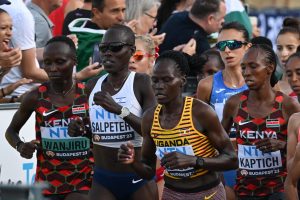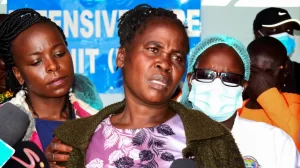‘I can’t sleep’: What an athlete’s murder tells us about women’s safety in Kenya
4 min read
The tragic murder of Olympic runner Rebecca Cheptegei by her former partner has sparked renewed outrage and calls for action against femicide in Kenya. The 33-year-old Ugandan athlete died after being doused in petrol and set ablaze by her ex-boyfriend at her home in Trans Nzoia County, highlighting a severe issue of gender-based violence in the region.
Kenya has one of the highest rates of violence against women in Africa, with reports indicating that over ten women were victims of femicide just in January. The United Nations defines femicide as the killing of women due to their gender, a grim reality that many women in Kenya face.
Jane, a survivor of domestic violence who spoke to the BBC under a pseudonym, has been living in hiding for much of the past year. She sustained severe injuries from a brutal stabbing by her ex-partner. “His intention was to kill me. He stabbed me and left me for dead. Were it not for the neighbours, I would be dead,” she recalls. Jane endured years of escalating abuse, finally leaving when her children became targets.
“I live in fear,” she says. “He threatens to finish me off. I can’t sleep at night.” Jane now relies on medication to manage her mental health, feeling trapped in a life that resembles imprisonment.
According to a 2018 World Health Organization report, 38% of women in Kenya aged 15 to 49 have experienced violence from intimate partners. Support organizations for survivors report a disturbing increase in cases year after year. Njeri Migwi, head of Usikimye, notes that they receive around 50 calls daily, a testament to the growing crisis.

In 2021, former President Uhuru Kenyatta labeled gender-based violence as “a national crisis.” However, a government report a year later revealed that 41% of married women had faced physical violence. Research by Africa Data Hub indicated over 500 reported femicides in Kenya between 2016 and 2023, with 75% committed by acquaintances or intimate partners.
Sunita Caminha, a UN Women specialist, emphasizes that women from diverse backgrounds are increasingly victimized in a climate of gender inequality and discrimination. The latest UN report shows that Africa accounts for a staggering share of global femicides, with 20,000 women murdered.
The murder of Cheptegei has left many in the athletic community traumatized. Long-distance runner Joan Chelimo, co-founder of Tirop’s Angels (an organization formed after the murder of another athlete, Agnes Tirop), shared her distress: “I can’t sleep, imagining that someone was just burnt alive.” Cheptegei had reportedly informed the police about the abuse she faced, but little action was taken.
Critics argue that despite existing laws aimed at curbing gender-based violence, implementation remains weak. Judy Gitau, Africa regional director for Equality Now, notes that governments often think passing laws is enough, overlooking the need for enforcement.
Jane’s experiences echo this sentiment. She describes how her reports of abuse were often dismissed by the police as mere domestic disputes. “One policewoman told me, ‘We cannot arrest him until he does something.’ The next day, he stabbed me,” she recalls.

Although gender desks were introduced in Kenyan police stations to facilitate reporting of gender-based violence, only half of the stations are equipped with them. In Trans Nzoia County, where Cheptegei lived, the only gender desk is at the county headquarters, leading to delays and underreporting of cases.
Cheptegei was the third female athlete in Kenya to die at the hands of an intimate partner in recent years. Agnes Tirop was found murdered just weeks after breaking a world record, and Damaris Muthee Mutua was discovered strangled in her home. Both had reported issues with their partners before their deaths, underscoring a pattern of violence linked to intimate relationships.
Gender-based violence is deeply entrenched in East African communities, often driven by patriarchal norms that marginalize women. As female athletes gain financial independence, they increasingly challenge traditional roles, which can provoke violent responses from partners.
In response to the ongoing crisis, calls for more safe houses for survivors have intensified. The government claims it is working on sensitization programs and reviewing legislation, but advocates stress the urgent need for effective action.
Jane hopes for a future where women like her can find safety. “As long as he is free, I’ll never have peace,” she states. The tragic case of Rebecca Cheptegei serves as a haunting reminder of the critical need for systemic change to protect women from violence in Kenya.






